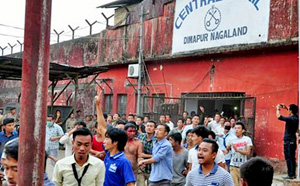Dimapur(Nagaland), Mar 7: Jamal Uddin Khan, the brother of the man lynched in Nagaland's Dimapur on Thursday, has claimed that medical reports have shown that the woman who had filed a rape complaint against his brother had not been sexually assaulted.
Speaking to media, he alleged that his brother, Syed Sarif Uddin Khan, had been made a scapegoat and framed by Naga groups, and claimed that the police were hand in glove in the incident.
"Is the Nagaland government running a jungle raj? The girl who filed the rape complaint was my brother's wife's cousin. Nagaland police have said that the medical reports say she was not raped," said Jamal Uddin Khan to reporters.
"There are multiple members of our family serving in the Army. How could they have killed him claiming he was Bangladeshi? My brother was made a scapegoat," he added.
Jamal Uddin Khan said he and another brother, Kamal Khan, are currently serving in the Indian Army's Assam regiment. Yet another brother, Iman Uddin Khan, too had been in the Army, and had been killed in the Kargil conflict in 1999. Their father, Syed Hussain Khan, had retired from the Indian Air Force, and their mother continues to draw his pension. Jamal Uddin Khan claimed that his family hailed from Assam's Karimganj District.
A number of questions have been raised over the events leading to the lynching. These include questions over the unavailability of a medical report to confirm the rape of the Naga woman, for which Syed Sarif Uddin Khan had been charged. Other questions surround to the Nagaland police not confirming the whereabouts of the alleged rape victim and why police had initially claimed that Syed Sarif Uddin Khan was an illegal Bangladeshi immigrant.
Syed Sarif Uddin Khan had been lynched by a mob on Thursday. The 2000-strong mob had broken into the Central prison in Dimapur, where he was in judicial custody on rape charges, paraded him naked through the town, beat him to death and hung his body from a clock tower.
Naga civil society groups have condemned the lynching. They also attacked both the Centre and state governments, alleging that they were apathetic to their growing concerns over illegal migrants in the region. They also said they still suspect that Syed Sarif Uddin Khan was an illegal immigrant.
"We resent the Assam government's vote bank politics. Anyone can procure documents for citizenship proof for even 50 rupees, and even manage a job here. We strongly suspect Khan to be an illegal migrant, even if he has a (documentary) proof," said Joel Naga, general secretary of Naga Council, a civil society group.





Comments
Add new comment